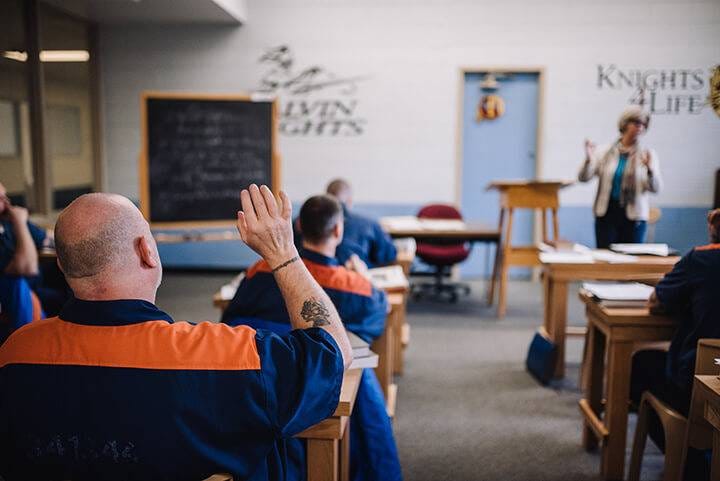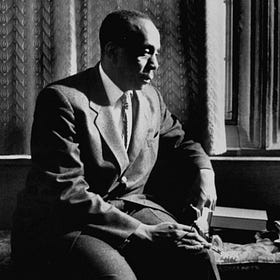This winter has been a full season for the Barth Center. We are launching a brand new website and a new podcast soon. But we are also gearing up for the upcoming 2025 Barth Conference in June. This year, we are focusing on the theme of incarceration in critical conversation with Barth’s theology and life experience as a decade-long preacher in the Basel prison. I have been privileged to partner with three other prison studies programs at three other institutions to organize this dynamic conference—the Calvin Prison Initiative at Calvin University, the Prison Studies Program at Duke Divinity School, and the PREP program at Drew Theological School. There is a very strange (but refreshing!) Venn diagram that one could create between the overlap of those interested in Barth’s theology while also being committed to carceral work/studies.
Yesterday, I had the chance to visit the Calvin Prison Initiative (CPI) at Handlon prison in Ionia, Michigan. Dr. Todd Cioffi, the current CPI Senior Advisor, graciously let me visit the program and meet many of the men who are currently enrolled in Calvin’s undergraduate program. In all honestly, I did not know what to expect when I walked through security. But once we arrived at the programming wing of the prison, I was amazed by what I saw. Dozens of men, each with their own laptop, were writing and studying away. Some were reading books on Christology, written by many colleagues who read this online magazine, while others were reading Plato’s Republic. The CPI has built an impressive library on-site with over 5,000 titles. Seeing books on the stacks by Ernst Käsemann, Angela Davis, and Willie Jennings took on a new level of meaning for me. To my surprise, all the Karl Barth books were checked out.
I learned halfway through my visit that 2/3 of the men in the program are serving life without parole. Most prisons in the United States do not let those serving a life sentence without parole take part in programming. But CPI had a different vision for these men: they wanted to give each person in the program, regardless of their sentence, the opportunity to experience a learning community. I had the chance to speak in-depth with one of the men named Harv, who graduated from the program and now tutors current students. I could see that Harv had a story to tell as I noticed all the tattoos on his arms, each seeming to detail an event in his life. Harv told me mid-conversation that he was incarcerated when he was 19 years old and has served 31 years in prison. Harv went on to detail CPI’s personal impact on his life. “They treat me like I’m human. Do you know how special that is?” All I could do was nod. “I never had a voice throughout my life for various reasons. But my professors gave me a voice.” Harv and one of his friends told me stories of how the program enabled radical reconciliation between men in the prison who were previously divided along racial and religious lines. Some classes require the students to work in small groups with other students whom they hate. Harv and his friend told me how these groups transformed two men who hated each other into best friends who now share a cell together.
I don’t want to romanticize the reality of being in prison for these men in the program. They are still serving sentences in a very difficult prison. However, everyone I spoke with talked about the radical culture change that has taken place inside the prison over the last ten years since CPI developed. Men told me that they did not feel like they had to lock their cell doors all the time for the first time since they arrived at Handlon. They no longer feared being physically assaulted all the time. I could not help but think, no matter how fragmentary, that the testimonies I heard were parabolic of the Kingdom of God.
Part of what is so meaningful to me about the upcoming Barth conference is that the center will live-stream the conference to all the students currently enrolled in the CPI at Handlon prison. The men were elated to learn they could participate, ask questions, and converse with others about a topic in which they are experts. One of the CPI graduates, Shawn England, who was recently released from the Handlon prison, is now a master's student at Calvin Theological Seminary. He will respond to Todd Cioffi’s plenary lecture at the conference. Shawn is a witness to what is possible when we invest resources and care into those who are currently incarcerated and imagine otherwise beyond the current punitive carceral system.
I left the prison yesterday afternoon with a deep sense of urgency and hope I did not have when I went in hours earlier. As I processed the visit with Todd (and asked him more than eight dozen questions!) on the drive back to Calvin University, I became more and more energized for the upcoming conference in June. I was thankful to Todd for allowing me to see something so transformative and for partnering with me to organize the upcoming June Barth conference. I am excited about how this conference might create new relationships, conversations, and possibilities for the center’s work in the years ahead.
We launched registration for the conference yesterday. If you can join us this June, either in person or virtually, we would love for you to be part of this critical conversation. And if you do not have the funds to afford the conference registration fee, please email me at the Barth Center’s email (barth.center@ptsem.edu). We would be delighted to give you a discount code.
I hope to see you in June!
— Kait Dugan, Director
📚 Donate your Church Dogmatics
The Barth Center is collecting used sets of the Church Dogmatics to gift to students who can not afford a brand-new set. Do you have a set of the Church Dogmatics that you want to donate or sell to a student? Email us: barth.center@ptsem.edu
📝 January and February Highlights
“The Church is what we do next”
To put it succinctly, what God does next must precipitate what we do next. So rather than retreating into the fantasy of a Church comprised entirely of people who seek Christ, I think first I need to pray that Jesus “accept and make use” of my witness to his work in my life. I need to ask the risen Christ to once again encounter me, to once again encounter my parish, to once again encounter all of us who claim his Name, come what may.
The Man from Galilee
By joining both Thurman and Barth’s insights together, we can further understand and affirm that the God revealed in Jesus of Nazareth—the Man from Galilee—is the Holy One who has come into the world to overcome the fallen human condition in all of its dimensions—social, political, personal, ecological, cosmic—by assuming the condition of the oppressed (sinned-against) and oppressor (sinner) alike. By doing so, Jesus addresses both groups with the good news of salvation and liberation for all. In short, Thurman and Barth find in Jesus the God who is for us!
January Book Notes
Raymond Carr’s Theology in the Mode of Monk trilogy is a profound exploration of how theology can be revitalized through the aesthetics and logic of jazz. Each volume builds on the last, creating a theological symphony that challenges readers to embrace improvisation, complexity, and the dynamic interplay of revelation and experience. This trilogy is a masterclass in theological innovation, offering new ways to think about freedom, liberation, and the role of theology in a broken world.
A conversation about Chris Haye’s new book that turns theological. Join the Feminist Theology Network mailing list. Princeton University reportedly implicated in Gaza and Sudan wars. A new book on Barth and Pentecostal theology. Attend the 2025 Koinonia Forum graduate student conference online this Friday. Inside the Oscar-Nominated Film That No Studio Will Touch. Prayer as Resistance 2.2: Notes of Rest with Julian Davis Reid. “Without fear none of us could survive; and yet with fear none of us will survive.” The 2025 Barth Tagung in Switzerland this July. A Political Spirituality of Resistance in conversation with Karl Barth and Michel Foucault. 2025 LA Theology Conference on the theme “Receiving Redemption.”











